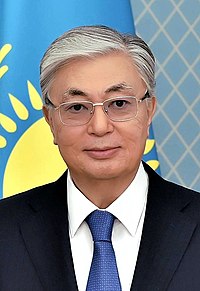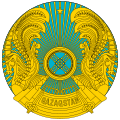President of Kazakhstan
| President of the Republic of Kazakhstan Қазақстан Республикасының Президенті Qazaqstan Respublikasynyñ Prezidentı | |
|---|---|
 Presidential Standard | |
since 20 March 2019 | |
| Style | Mr President (informal) His Excellency (diplomatic) |
| Type | Head of state |
| Residence | Ak Orda Presidential Palace |
| Appointer | Direct popular vote |
| Term length | Five years, renewable once |
| Inaugural holder | Nursultan Nazarbayev |
| Formation | 24 April 1990 |
| Salary | ₸7,876,032.18[1][2] |
| Website | (in Kazakh) akorda.kz (in English) www.akorda.kz/en |
 |
|---|
|
|
|
The president of the Republic of Kazakhstan (Kazakh: Qazaqstan Respublikasynyñ Prezidentı; Cyrillic: Қазақстан Республикасының Президенті; Russian: Президент Республики Казахстан) is the head of state of the Republic of Kazakhstan and the commander-in-chief of the Armed Forces of the Republic of Kazakhstan. The president is the holder of the highest office within the Republic of Kazakhstan. The powers of this position are described in a special section of the Constitution of Kazakhstan.
The position was established on 24 April 1990, a year before the dissolution of the Soviet Union. The current president is Kassym-Jomart Tokayev, who assumed office on 20 March 2019 following the resignation of the first president, Nursultan Nazarbayev.[3]None of the presidential elections held in Kazakhstan have been considered free or fair by Western standards[4] with issues noted including ballot tampering, multiple voting, harassment of opposition candidates and press censorship.
Symbols
The president of Kazakhstan's decorations include a breast mark and a Presidential Standard.
Presidential Standard
The Standard of the President of Kazakhstan is similar to the national flag in that it is rectangular in shape with a ratio of 1:2. In the center of the standard is the Emblem of Kazakhstan. It is bordered on three sides with golden fringe.[5][6]

The current presidential standard has been in service as recently as 2012. The former standard, which was used from 1995–2012, was a light blue rectangle there with a golden circle in which the figure of the young Kazakh leader Sakas riding a snow leopard.
Altyn Qyran Order
The Order of the Golden Eagle (Kazakh: Алтын Қыран ордені or Altyn Qyran Order) is the highest civilian award that can be awarded by the president of Kazakhstan. Its purpose is to recognize outstanding service to the country by Kazakh and foreign citizens. As head of state, the president is de facto Commander special class of the Order of Altyn Kyran.[7][8]
President in the Constitution
Item 5 of Article 42 of the Constitution determines that no one can be elected president more than two terms in a row, but it also states that "The present restriction shall not extend on the First President of the Republic of Kazakhstan." [9]
Article 46 says that the president's "honor and dignity shall be inviolable" and that his expenses shall be paid by the state. Item 4 of the article outlines the special status and authority of the first president, and refers to a special constitutional act for definitions.[9] According to this act, the first president possesses total, absolute and termless immunity for all actions he performs while in office, and that he remains a government official until his death. He also retains the ability to speak to the people of Kazakhstan, keeps guards, communication, transport, and state support of his activity, and that his official apartment and summer residence became his property with official maintenance. He is also provided with medical care, sanatorium, pensions and insurance.
On April 26, 2015, Nursultan Nazarbayev was re-elected for his 5th presidential term.[10] The official ceremony of the inauguration took place at the Palace of Independence in Nur-Sultan on April 29.[10] At the inauguration ceremony the re-elected president assured the nation that he would continue the 5 institutional reforms that he had offered earlier, which would contribute to the consistent growth and development of the country.[10]
On January 25, 2017, President Nursultan Nazarbayev laid the groundwork for reforms to the constitution that would redistribute executive powers to the parliament and ministries for the purpose of more open and efficient governance.[11]
Presidential Administration

The Presidential Administration of the Republic of Kazakhstan (Kazakh: Қазақстан Республикасы Президентінің Әкімшілігі/Russian: Администрация Президента Республики Казахстан) reports directly to the president and aids him/her in their everyday dates. It was established in accordance of Presidential Decree No. 2565 on October 20, 1995. It is currently based at the Ak Orda Presidential Palace in the capital city of Nur-Sultan. Prior to that, it was based in Almaty.[12]
Latest election
This section needs to be updated. (June 2019) |
Prior to the 2011 election, President Nazarbayev wrote an op-ed for The Washington Post titled "Kazakhstan’s steady progress toward democracy".[13]
Kazakhstan's fifth presidential election was held on April 26, 2015.[14] Nursultan Nazarbayev was re-elected with 97.7% of the vote. A total of 858 observers from 19 countries were present at the polling stations during the election.[citation needed] According to Joseph Misfud, member of the election observation mission from Great Britain and head of the Diplomatic Academy of London, "the elections met all the EU standards".[15]
The Organization for Security and Co-operation in Europe (OSCE) and other international monitors criticised the election as unfair, with issues noted including the closure of media outlets critical of the government and the jailing of opposition activists.[16] OSCE spokesperson Cornelia Jonker criticised the lack of a "genuine choice" for voters and also argued that there were "significant restrictions to the freedom of expression."[17]
The date of Kazakhstan's fifth presidential election is June 9, 2019. It is the first election since the resignation of the first president of Kazakhstan, Nursultan Nazarbayev.[18]
Presidents of Kazakhstan (1990–present)
The "No." column consecutively numbers the individuals who have served as president, while the "Elected" column consecutively numbers the presidential terms or administrations.
| No. | Portrait | Name
(Birth–Death) |
Elected | Term of office | Political party | ||
|---|---|---|---|---|---|---|---|
| Took office | Left office | Time in office | |||||
| 1 | File:Nazarbayev Portrait.jpg | Nursultan Nazarbayev Нұрсұлтан Назарбаев (1940–) |
1990[a] | 24 April 1990 | 1 December 1991 | 28 years, 330 days | QKP |
| (1) | 1991 | 1 December 1991 | 14 December 1991 | Independent | |||
| 14 December 1991 | 20 January 1999 | ||||||
| 1999 | 20 January 1999 | 1 March 1999 | |||||
| (1) | 1 March 1999 | 11 January 2006 | Otan | ||||
| 2005 | 11 January 2006 | 1 December 2006 | |||||
| (1) | 1 December 2006 | 8 April 2011 | Nur Otan | ||||
| 2011 | 8 April 2011 | 29 April 2015 | |||||
| 2015 | 29 April 2015 | 20 March 2019[19] (resigned from office) | |||||
| — | 
|
Kassym-Jomart Tokayev Қасым-Жомарт Тоқаев (1953–) |
— | 20 March 2019[20] | 12 June 2019 | 5 years, 226 days | Nur Otan |
| 2 | 2019 | 12 June 2019 | Incumbent | ||||
Rank by time in office
| Rank | President | Time in office | |
|---|---|---|---|
| 1 | Nursultan Nazarbayev | 28 years, 330 days[21] | |
| 2 | Kassym-Jomart Tokayev | 5 years, 226 days | |
See also
Notes
- ^ Elected as the President of the Kazakh Soviet Socialist Republic
External links
References
- ^ "Зарплаты президентов – Новости Таджикистана ASIA-Plus". news.tj. Archived from the original on 2019-06-03.
- ^ "Сколько зарабатывает Путин и президенты других стран / FinHow.ru". finhow.ru.
- ^ Kazakhstan President Embassy of Kazakhstan
- ^ Kazakhstan's long term president to run in snap election – again, The Guardian, 11 March 2015
- ^ "Официальный сайт Президента РК :: КАЗАХСТАН". 5 October 2008. Archived from the original on 5 October 2008.
- ^ "Персональная страница". personal.akorda.kz. Archived from the original on 2019-06-01. Retrieved 2019-03-25.
- ^ "Symbols of power". Akorda. Archived from the original on 9 July 2015. Retrieved 25 March 2019.
- ^ "Awards and orders of the Republic of Kazakhstan". Government of Kazakhstan. Retrieved 25 March 2019.
- ^ a b Constitution of the Republic of Kazakhstan Archived 2007-10-20 at the Wayback Machine Constitutional Council of the Republic of Kazakhstan
- ^ a b c "Re-elected President Inaugurated, Announces Five Reform Efforts". astanatimes.com.
- ^ "Kazakh President Unveils Plans of Constitutional Reforms". The Astana Times.
- ^ "Электронное правительство Республики Казахстан -". egov.kz.
- ^ Kazakhstan’s steady progress toward democracy Washington Post
- ^ "Nearly 10 mn voters to head to polls to elect Kazakh president". latino.foxnews.com. Archived from the original on 2016-01-01.
- ^ "Elections in Kazakhstan meet all EU standards – Joseph Mifsud". 2015-04-26. Retrieved 2019-06-01.
- ^ "Kazakh strongman says sorry for landslide election victory". telegraph.co.uk. 27 April 2015.
- ^ Kazakhstan president Nursultan Nazarbayev wins re-election with 97.7 per cent of vote, ABC Australia, 28 April 2015
- ^ "Early presidential election in Kazakhstan set for June 9; President Tokayev pledges fair and transparent vote". The Astana Times.
- ^ "Kazakh President Nazarbaev Abruptly Announces Resignation". RadioFreeEurope/RadioLiberty. Retrieved 2019-03-19.
- ^ "Обязанности президента Казахстана будет исполнять спикер Сената Токаев". ТАСС.
- ^ Counting from the declaration of independence on 16 December 1991.


